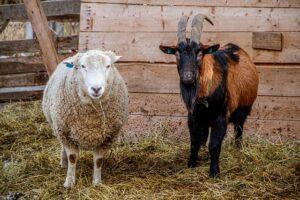Domestic measures ordered due to peste de petits ruminants
Peste de petits ruminants (PPR) is a highly contagious viral disease of sheep and goats that causes great economic damage. The main factor in its spread is direct and indirect contact between live animals, which is why the risk of live animal trade and transport is particularly high. In order to eradicate the epidemic as soon as possible, the national chief veterinarian has introduced strict measures.

(Photo: Pixabay)
The main factor in the spread of PPR is direct and indirect contact between live animals, but it can be introduced into the herd via clothing, tools, vehicles, and feed and bedding can also be carriers of the virus.
With the outbreak of the epidemic, Hungary lost its previously free status registered with international organizations
As a result, official veterinarians cannot issue the certificates required for the transport of animals or products, which is why our export market is significantly narrowing. Within the European Union, small ruminants can be traded outside the declared restricted areas, subject to compliance with the appropriate rules.
Based on the characteristics of the virus and the spread of the disease, the national chief veterinarian has taken the following measures
- A visit ban has come into effect in all wildlife parks, petting zoos and village museums keeping small ruminants in Zala County until February 10, 2025.
- The introduction of small ruminants to fairs and the organisation of small ruminant exhibitions is prohibited throughout Hungary until February 15.
- A traffic restriction has come into effect for small ruminants throughout Zala County until February 6.
- In settlements within the ATEV transport route, samples must be taken from all small ruminant herds (commercial and private) for serological and virological testing for KP disease.
- Small ruminants transported from Zala County to other areas of the country since January 15th will be detected by the veterinary authority and subjected to diagnostic tests for KP disease.
- In order to prevent the further introduction of the disease, the import of sheep and goat shipments from Romania to the destination address in Hungary is prohibited!
- The county government offices and the Nébih Priority Affairs Directorate are paying increased attention to the inspection of transit shipments from Romania and the detection of possible illegal animal transports with the involvement of the police and the National Tax and Customs Administration.
The authority will carry out all ordered diagnostic tests at state expense!
The national map depicting the protection and surveillance zones, the map detail affecting Zala County, and the list of settlements affected by the restrictions can be viewed on the Nébih website. In order to mitigate the direct and indirect damage caused by the disease, Nébih calls on animal keepers, live animal traders and transporters to behave responsibly and cooperate with the animal health authorities. The common interest of all concerned is to successfully prevent the spread of the disease and eradicate the outbreak as soon as possible!
Nébih
Related news
SIRHA Budapest 2026 – The biggest domestic celebration of the HoReCa sector
🎧 Hallgasd a cikket: Lejátszás Szünet Folytatás Leállítás Nyelv: Auto…
Read more >The risk of introduction is increasing – the Japanese beetle has already appeared in Croatia
🎧 Hallgasd a cikket: Lejátszás Szünet Folytatás Leállítás Nyelv: Auto…
Read more >Related news
II. Green Gastronomy – Marketing Communication Workshop organized by the MMSZ HoReCa and Green Section
🎧 Hallgasd a cikket: Lejátszás Szünet Folytatás Leállítás Nyelv: Auto…
Read more >Retail sales of organic products in Hungary increased by 13.9% – our country is the second fastest growing market in the European Union
🎧 Hallgasd a cikket: Lejátszás Szünet Folytatás Leállítás Nyelv: Auto…
Read more >Nearly 140 domestic suppliers, 60% growth – SPAR Regions Treasures program accelerates with AI solutions
🎧 Hallgasd a cikket: Lejátszás Szünet Folytatás Leállítás Nyelv: Auto…
Read more >







